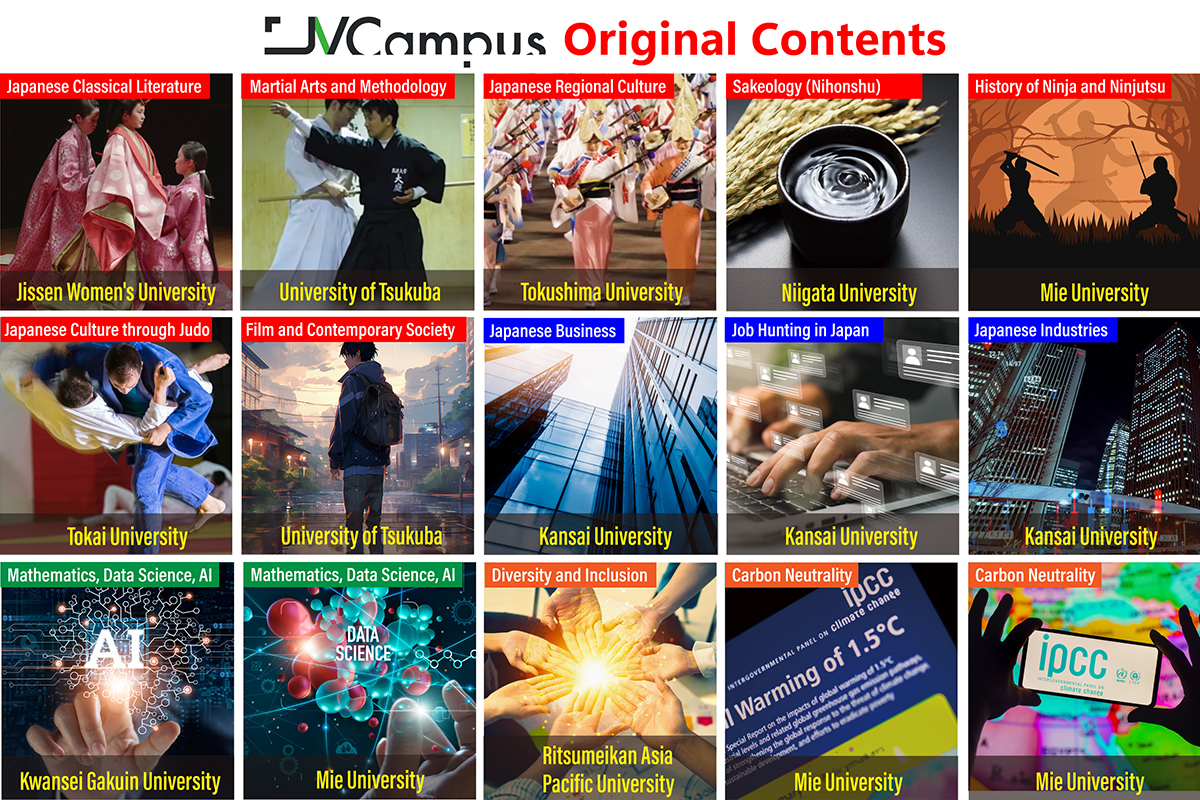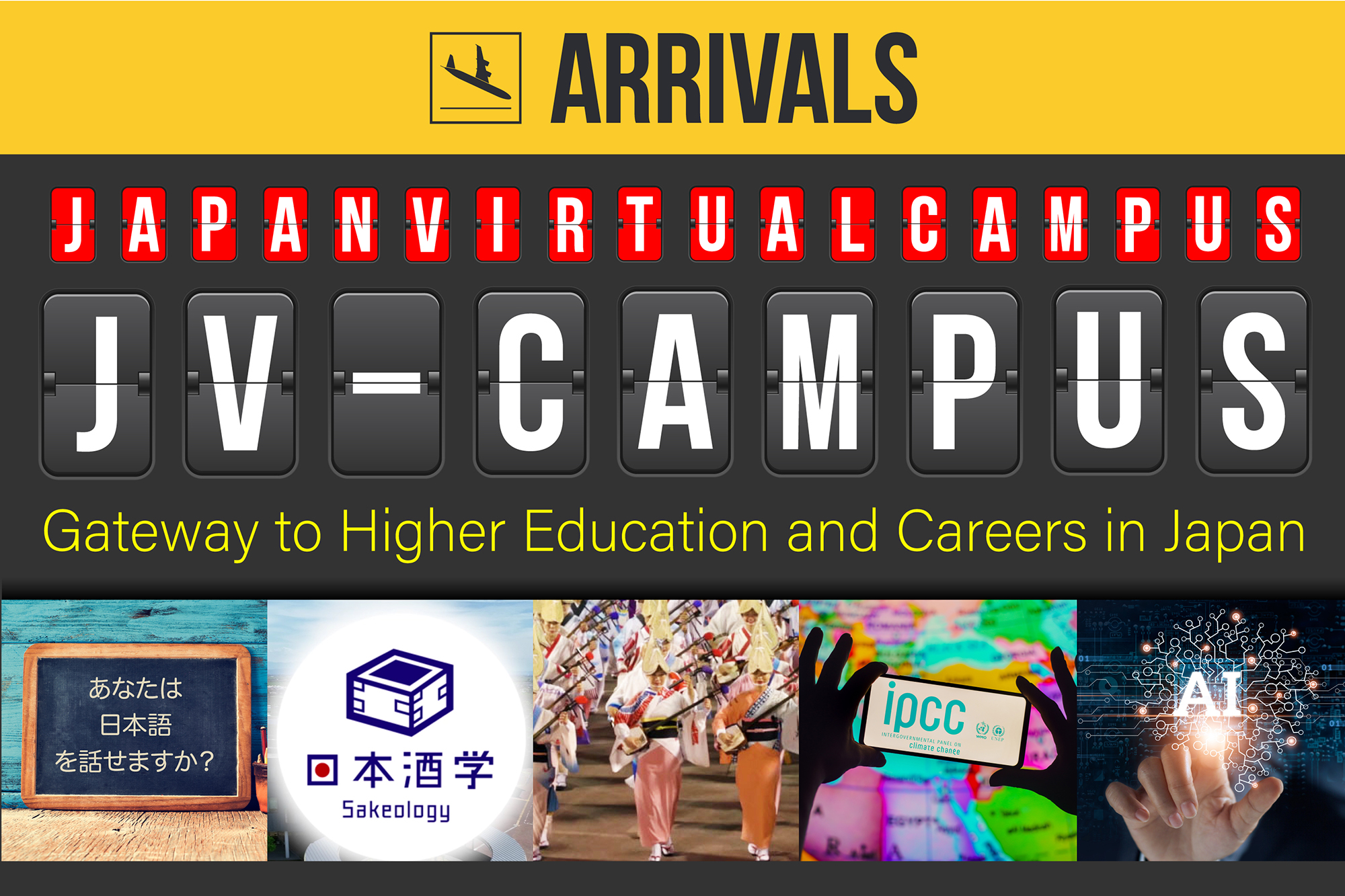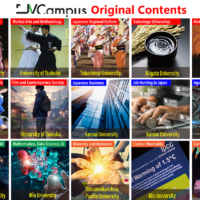University courses with names such as Challenges and Prospects of Cross-Cultural Communication in Japan; How to Enjoy Buddhist Art; The Japanese and Their Bowl Culture; and Interactive Computer Graphics may conjure images of several weeks in lecture halls. But these are all courses offered through Japan Virtual Campus to everyone, anywhere in the world.
JV-Campus is an online Japanese higher education portal with hundreds of courses, videos and other learning content organized into 14 categories, including agriculture, medicine, international affairs, business management and tourism. Launched in 2022, the platform is a place for international students to begin their studies on Japan, without actually being in Japan. In addition, JV-Campus facilitates real-world ties with companies and local governments through internships, study programs and networking opportunities. A project of the Education Ministry, JV-Campus’ tagline is “From Virtual to Real: A Gateway to Japanese Higher Education.”
One-stop shop for study and work in Japan
JV-Campus is not merely another online learning website. It is focused on helping international students use experiences on the portal as stimuli for continuing their education or taking jobs in Japan. The platform aims to become a one-stop shop for resources and procedures necessary for studying or working in Japan. By providing information on universities or companies and helpful resources for living in Japan, JV-Campus wants to ensure that international students are sufficiently prepared for life in Japan before they embark on their journey.
Once the students are in country, JV-Campus stays involved by helping them succeed, providing business-language courses and support in finding employment when they graduate. Japan is currently on a drive to increase the number of international students to 400,000 by 2033, about the same as before the pandemic.
As much as it is dedicated to encouraging foreign students to choose Japan, JV-Campus also has a goal of supporting Japanese students looking to study abroad. It intends to do this in much the same way it supports international students — by providing thorough language preparation, access to resources and brokering ties with local communities.
Japanese students can also have a smoother transition by taking simulated classes at universities of their choice before leaving Japan.
The government is aiming to increase the number of Japanese students studying abroad to 500,000 by 2033.

Local, global community ties
JV-Campus is an outgrowth of the Super Global University project. Under that project, universities received government funding to beef up internationalization through initiatives, such as diversifying their faculties and student bodies. A continuation of the globalization push, JV-Campus hosts nearly 100 leading universities and facilities from Japan and overseas offering content across more than 1,000 topics. The content is divided into “boxes,” labeled by target audience or common features. For example, there are 41 courses in the Japanese language box and another 527 selections containing courses and course content in the student support box. Universities offer their strongest educational content, showcasing the fields for which they are best known. In this sense, JV-Campus plans to function as a hub for the highest quality educational content from across Japan, and eventually, the world.
However, it is not only universities that offer courses on the platform. Related to JV-Campus’ mission of building connections between students and the real world, organizations such as The Japan Foundation and public broadcaster NHK World also have courses on the platform. JV-Campus itself is engaged in ongoing development of original, high-quality courses. All participating universities can share and use these courses.
Currently, four Taiwanese universities are the only institutions outside of Japan on the platform. However, attracting and retaining students from countries in the Association of Southeast Asian Nations so they can eventually join the dwindling Japanese workforce, is one of JV-Campus’ goals. The platform intends to make use of an online portfolio management system for recruiters to view the students’ work and begin the hiring process.
While some of the courses on the platform are free, others are paid. Some are on-demand, and some are offered only during specific periods. The platform also offers consideration to students who may be facing financial obstacles in accessing higher education. Seventy-four universities and facilities offer 472 course and content titles to support such students. At the same time, seven universities have 27 courses available specifically for Ukrainian students.
Site usability prioritized
JV-Campus is an ambitious, multifaceted project that ensures constant innovation. Currently, it is headquartered at the University of Tsukuba in Ibaraki Prefecture. It aims to open new possibilities, worlds and levels of understanding not only for learners, but also for everyone involved, including the educators and administrators. Universities can also use JV-Campus’ content and services to increase internationalization among their employees by encouraging greater language competence or awareness of global issues.
JV-Campus’ multiplicity of purpose points to the expansive scope of the project, the overarching goal of which is internationalization through connecting virtual and real-life learning opportunities.
As the portal is the centerpiece of this push, its creators have prioritized the usability of the site. One can immediately search for courses at the top of the home page and course content is organized by category. There are also convenient browsing features that allow one’s interaction to be optimized from the perspective of going abroad or coming to Japan.
JV-Campus uses Moodle as a learning management system. The LMS has the capacity to issue reports and log courses users have completed. As some courses are paid, PayPal will soon be integrated as a payment option, making JV-Campus more accessible.

Responsive curriculum design for the future
As the needs of users evolve and become clearer, the platform intends to engage in dynamic and responsive curriculum development and create more courses. It will also continue to group courses offered by various institutions and promote packages based on user interest.
Even though it already has close to 30 Japanese courses, it is aiming to up this number by partnering with facilities for which this is a focus, as well as universities known for language education. Language has continually been cited as a reason many international students choose other destinations over Japan.
Mathematics, artificial intelligence and carbon neutrality are all areas in which JV-Campus plans to increase its offerings and pull students from wide-ranging backgrounds interested in traditional and emerging fields. Even while it is responding to the needs of students, JV-Campus will encourage other organizations to provide services and opportunities to students as part of their corporate social responsibility.
Starting in the 2025 academic year, students will be able to receive university credit for courses taken through JV-Campus, depending on the university. JV-Campus will also set standards for microcredentialing and prepare courses that will grant digital badges.
As it continues its internationalization push, JV-Campus intends to develop more innovative features and services aimed at connecting virtual and real-world encounters.
For more information, visit https://www.jv-campus.org/en/






